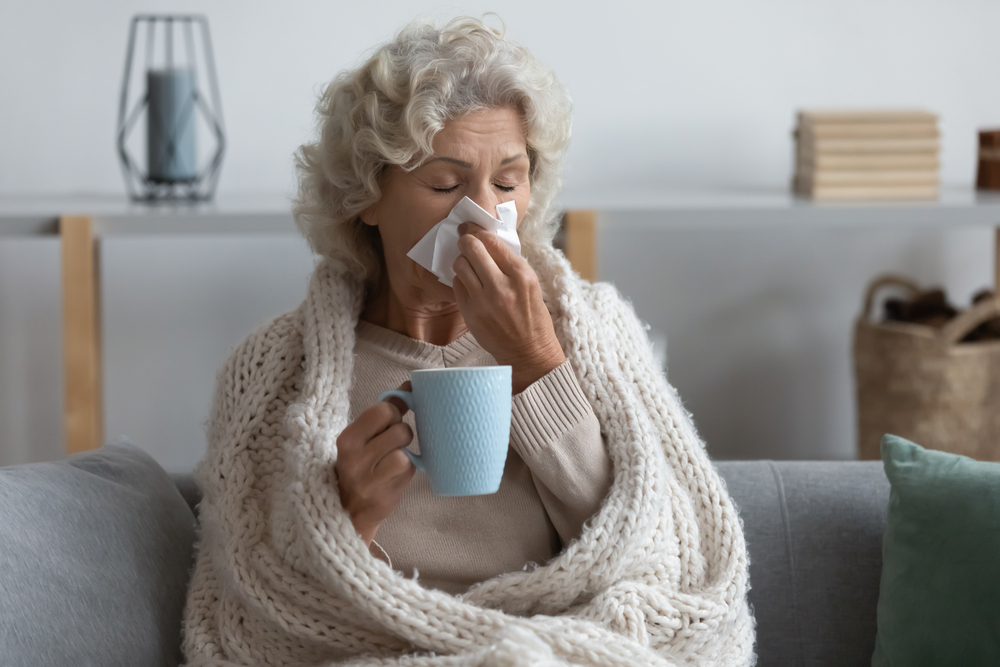- A runny nose is caused by excess mucus production in the nasal passages and is often a symptom of the common cold, sinusitis, or allergies.
- Some effective home remedies for a runny nose include drinking fluids, inhaling steam, eating spicy foods, and using a nasal spray.
- While a runny nose does typically resolve itself, there are some scenarios where it may be best to contact a doctor.
A runny nose is an uncomfortable symptom that can occur for a variety of different reasons. Typically a runny nose is caused by the common cold, but can also occur due to sinusitis, allergies, or even simply cold weather.
Healthline explains that a runny nose is caused by excess mucus production in the nasal passages. This excess mucus can lead to watery secretions that drip from the nose and may also drip down the back of the throat. Luckily there are quite a few home remedies that can effectively treat a runny nose, which we’ll outline below.
Drink Fluids
While it may seem cliché, drinking plenty of fluids is a very helpful tool when dealing with a runny nose. Drinking fluids and staying hydrated helps to thin out the mucus in your sinuses, according to Healthline. This makes it easier for you to expel the mucus since it thins out to a runny consistency. Otherwise, it may stay thick and sticky and keep your nose more congested.
With that being said, it’s just as important to avoid fluids that may dehydrate you further. This includes drinks such as coffee and alcohol which may actually make your runny nose worse.
Hot Tea
Hot tea is a home remedy that has double the effectiveness. Since it’s a liquid, it can help to keep you hydrated and thin out the mucus in your sinuses. The heat and the steam from hot tea may also help to open and decongest the airways, according to Healthline. To receive maximum benefit from hot tea, try inhaling the steam before and while drinking.
When it comes to selecting a type of tea, some herbal teas may also contain herbs that act as mild decongestants. Look for teas that have herbs that are anti-inflammatory and antihistamines such as chamomile, ginger, mint, or nettle. And avoid teas that contain caffeine. Hot tea may also help to soothe symptoms that often accompany a runny nose such as a sore throat.
Humidifier
Another effective tool for treating a runny nose is adding a humidifier to your home. Multiple studies have indicated that inhaling warm steam from a humidifier can clear the airways and significantly improve mucus buildup.
Humidifiers work by turning water into vapor and infusing it into the air to add moisture. Breathing in moisture is an effective tool for thinning and soothing congested sinuses. Breathing dry air may further irritate your airways and contribute to your congestion. One important note is to ensure to clean your humidifier regularly as per the unit’s instructions to avoid bacteria and mold buildup.
Facial Steam
Similar to hot tea and a humidifier, steaming your face is another helpful tool to help ease a runny nose. There are facial steamer tools on the market that you can purchase, or you can go the DIY route and make a facial steamer at home.
To do this, Healthline recommends heating water on the stove to the point that steam is created, but not to the point that it is boiling. Next, place your face 8 to 12-inches above the steam for 5 minutes at a time. Take deep breaths through your nose and be sure to take breaks if your face gets too hot. Blow your nose afterward to remove mucus. You could also add herbs or essential oils to your pot for even further benefit. Eucalyptus, peppermint, pine, rosemary, spearmint, and thyme essential oils are all excellent options.
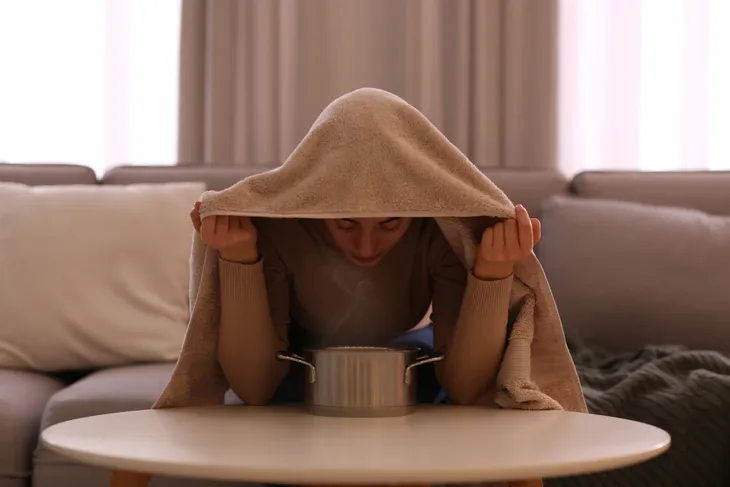 Shutterstock/New Africa
Shutterstock/New AfricaHot Shower Or Bath
A hot shower or bath is always relaxing, especially when you’re sick, but it can also help significantly to improve a runny nose. Similar to facial steam or a humidifier, the steam from a hot shower or bath can help alleviate a runny nose or nasal congestion.
Be sure to place your face directly in the steam and breathe in deeply to soak up the maximum benefit of this approach. The steam can also help to soothe your body and mind and promote quality sleep, which are all added bonuses when dealing with a runny nose.
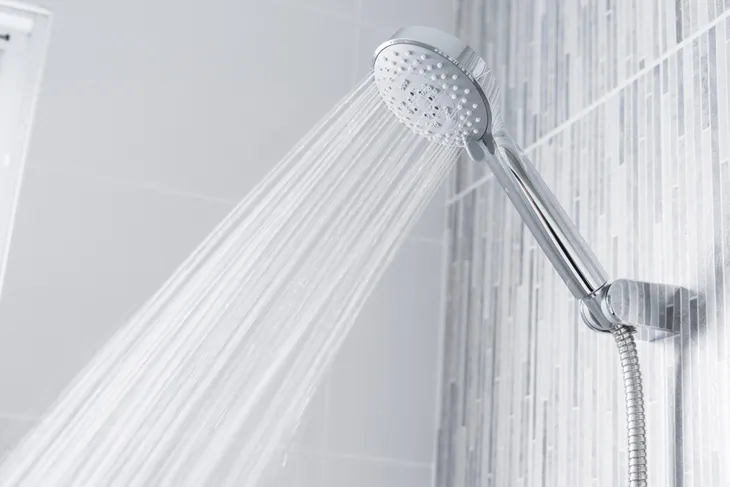 Shutterstock/ben bryant
Shutterstock/ben bryantNeti Pot
A tool that can significantly improve a runny nose is a neti pot. A neti pot is used for nasal irrigation to quickly rinse out your sinuses and relieve congestion or a runny nose. A neti pot is a teapot-like tool that has a spout and can be purchased at your local pharmacy or online.
To use a neti pot, you add a warm saline solution to the pot and pour the solution through one nostril and out the other. Be sure to follow your neti pot’s instructions carefully and always use sterile, distilled water rather than tap water.
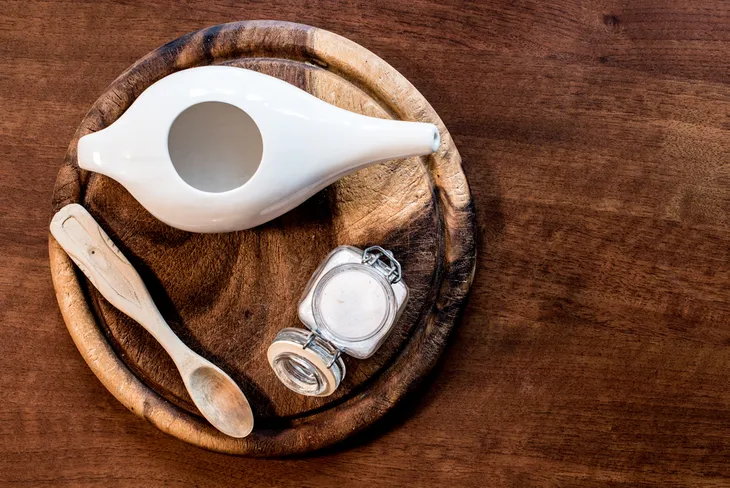 Shutterstock/MandriaPix
Shutterstock/MandriaPixNasal Spray
If you’re looking for an over-the-counter treatment for a runny nose, you may want to consider a nasal spray. There are medicated nasal sprays available to treat a runny nose, but there are also saline nasal sprays for a more natural approach.
A nasal spray targets congestion and mucus, similar to nasal irrigation. A 2021 study discovered that those who use a saline nasal spray with an upper respiratory infection experienced improvements in their runny nose, nasal congestion, and sleep quality.
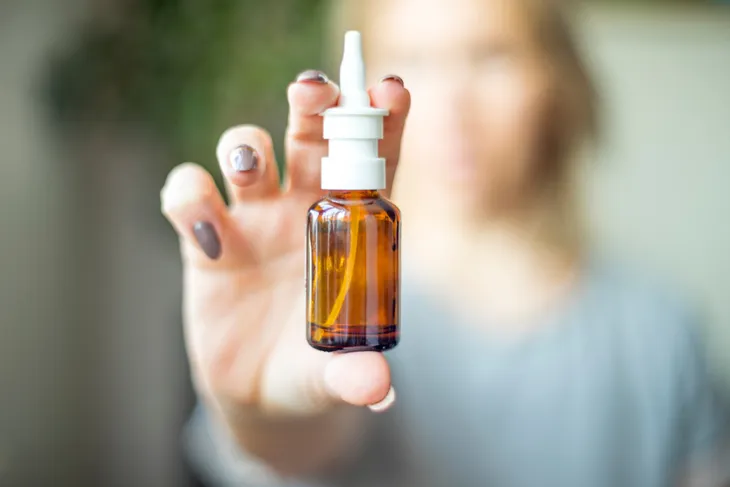 Shutterstock/UncleFedor
Shutterstock/UncleFedorWarm Compress
A warm compress or warm washcloth applied to your face is another helpful tool to relieve sinus congestion and a runny nose. Healthline explains that a warm compress is effective because it boosts blood circulation in the sinus area. If you use a damp washcloth, it can also help by adding moisture to the air you breathe to break up nasal congestion.
A warm compress is something easy you can try at home. Simply soak a clean cloth in hot water and place it on your forehead and nose for 15 to 20-minutes. You can repeat this process several times throughout the day for maximum benefit.
 Shutterstock
ShutterstockSpicy Foods
If you’re experiencing nasal congestion, eating spicy foods may be a helpful strategy to provide relief. If you are able to tolerate spicy foods, you might be surprised at how effective this technique is in relieving nasal congestion.
Some spices that are recommended for clearing the airways and relieving sinus congestion include cayenne pepper, ghost pepper, wasabi, horseradish, and ginger. If you’re not used to eating spicy foods, try easing your way into this by starting with a small amount of spice.
Prop Up Head On Pillow
If you’re having difficulty sleeping due to a runny nose, one strategy that may be helpful is propping your head up on a pillow. RestWell explains that propping your head on a pillow can help make it easier for your nose and sinuses to drain.
At night, it’s common for mucus to pool in the head which can cause headaches and make it difficult to breathe and sleep at night. Elevating your head on a pillow can help to drain the sinuses and relieve the pressure that may build up because of nasal congestion.
 Shutterstock/Ground Picture
Shutterstock/Ground PictureTips for Coping With a Runny Nose
A runny nose is never an enjoyable experience, but there are some tips that can make coping with the symptom a little easier. One of the most important tips is to be sure to allow yourself time to rest and to give your body time to heal. It’s also important to stay hydrated and intake plenty of fluids.
Blow your nose frequently to clear your nasal passages and ease sinus pressure. If you’re feeling sick, be sure to wash your hands, disinfect surfaces and stay home to avoid spreading your sickness to others.
When to Contact a Doctor
While a runny nose can be annoying and uncomfortable, it does often clear up on its own. Be sure to use the above tactics to ease a runny nose and relieve sinus congestion. Occasionally, a runny nose may indicate a more serious issue and it may be time to contact a doctor.
According to MayoClinic, it’s recommended to contact a doctor if your symptoms last more than 10 days, you have a high fever, your nasal discharge is green or yellow and accompanied by sinus pain, or if there is blood in your nasal discharge.
